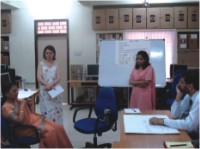Feature
Science journalism: a new horizon
Shameem Mahmud
 Science journalism is a relatively new branch of journalism, a recent addition to media in Bangladesh and other neighbouring countries. Historically, politics has always been the main agenda for media in Bangladesh, and it still dominates media coverage. Compared to other branches, coverage of science issues in mass media is scarce. It is in an incipient stage in terms of both quality and quantity. A good deal remains to be done, both from the industry and academic levels, to increase science coverage and promote science writers. Science journalism is a relatively new branch of journalism, a recent addition to media in Bangladesh and other neighbouring countries. Historically, politics has always been the main agenda for media in Bangladesh, and it still dominates media coverage. Compared to other branches, coverage of science issues in mass media is scarce. It is in an incipient stage in terms of both quality and quantity. A good deal remains to be done, both from the industry and academic levels, to increase science coverage and promote science writers.
In its ongoing efforts to support science and technology journalism in developing countries, the Science and Development Network (SciDev.Net) organised a South Asia consultative workshop on science journalism on April 30-31 at the University of Hyderabad (UH), India, in association with the UH's School of Communication and the UNESCO. Academics from South Asian universities, scientists, journalists and media workers participated in the workshop and shared views on the state of science reporting in their respective countries. I had the opportunity to participate in the event and placed a brief note on the state of science journalism in Bangladesh.
Like other developing countries, it is true that we don't have any science and technology reporter as such, to explore the different branches of science. Media does not yet recognise science as an independent issue to be covered by specified reporters. Thus, the scenario for science reporting in Bangladesh is not very bright. However, there is still some hope. A few years ago, hardly any newspapers published regular science features, but this situation has changed recently. There are weekly or fortnightly pages/supplements on science and technology in the mainstream dailies now. Change is also afoot in the broadcast media, especially in the television channels, where there are regular programmes on science and technology, though most of these programmes are biased towards computer and information technology issues.
Major newspapers and TV stations have reporters who cover IT and telecom events. Besides, reporters assigned to cover environment, health and other such issues also deal with scientific data regularly. The point is that though there is no specific sector devoted to science and technology like that in most overseas media houses, but reporters who cover health, environment and agriculture regularly deal with these issues. There are also regular supplements for health, agriculture and environment. We can easily utilize these supplements to train reporters who deal with increased science coverage in Bangladeshi media.
We should also be careful about another point. Science articles have the problem of technical jargon and excess of statistics. Most of these articles are mere translations from English, and in many cases come across as complicated and boring. It is necessary to encourage original science writing, preferably in local language. If science is presented from local sources, people will be more interested. Another important point is that the existing practice of science journalism in Bangladesh is nearly devoid of any investigative work. Normally, in political, social or economic issues, a journalist publishes an article only after thorough investigation. This aspect, however, is largely absent in case of scientific topics.
What is the status of science journalism in the academic arena of Bangladesh? Presently, a total of three public and at least five private universities offer degrees in Mass Communication, Journalism and Media Studies in Bangladesh. Besides, there are government run Press Institutes of Bangladesh (PIB) and National Institute of Mass Communication (NIMCO), which offer regular short courses for professional journalists. Moreover, Non-Government Organizations (NGOs) and private institutions run different short programmes both for professionals and aspiring journalists.
Most of these programmes limit the scope to newspaper or broadcast journalism in general. Unfortunately, none of them have a course on science journalism. Even the Masters programs do not have any courses that specifically deal with science and technology. Thus, science journalism remains an alien concept in the academic circles of journalism in Bangladesh. It would fair to assert that at this point, most science journalists in Bangladesh are self-educated. However, it is also fair to assert that there is scope to incorporate the matter into existing courses or to introduce new courses at the universities. We should consider the promotion and dissemination of scientific knowledge, and for this we can consider teaching science journalism in the journalism departments.
Considering the existing situation of Journalism and Mass Communication in the academia of Bangladesh, we can include a certain component of science journalism in the existing course of studies as follows:
a. For undergraduate courses, a short module on science journalism may be included in any existing course
b. For postgraduate courses, a separate course may be incorporated
c. Training courses, workshops and seminars for teachers, students as well as for professional journalists may be organized regularly.
In conclusion, it may be said that the initiative by the SciDev.Net to promote science journalism must be responded to by the media industry, as well as educational institutions involved in journalism, in South Asian countries, and this will encourage other developing countries to undertake similar actions.
Lecturer, Dept. of Mass Communication and Journalism, Dhaka University. E-mail: s.mahmud@bracnet.net
|
